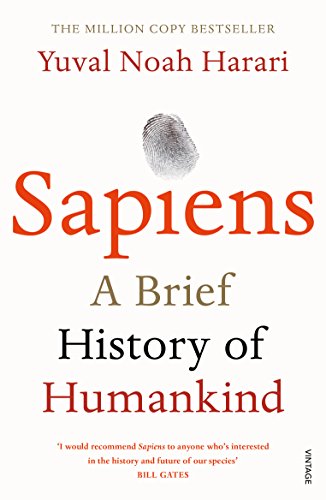
Sapiens: A Brief History of Humankind

Sapiens can cooperate in extremely flexible ways with countless numbers of strangers. That’s why Sapiens rule the world,
Yuval Noah Harari • Sapiens: A Brief History of Humankind
What was the Sapiens’ secret of success? How did we manage to settle so rapidly in so many distant and ecologically different habitats? How did we push all other human species into oblivion? Why couldn’t even the strong, brainy, cold-proof Neanderthals survive our onslaught? The debate continues to rage. The most likely answer is the very thing tha
... See moreYuval Noah Harari • Sapiens: A Brief History of Humankind
The story of the luxury trap carries with it an important lesson. Humanity’s search for an easier life released immense forces of change that transformed the world in ways nobody envisioned or wanted. Nobody plotted the Agricultural Revolution or sought human dependence on cereal cultivation. A series of trivial decisions aimed mostly at filling a
... See moreYuval Noah Harari • Sapiens: A Brief History of Humankind
Having so recently been one of the underdogs of the savannah, we are full of fears and anxieties over our position, which makes us doubly cruel and dangerous. Many historical calamities, from deadly wars to ecological catastrophes, have resulted from this over-hasty jump.
Yuval Noah Harari • Sapiens: A Brief History of Humankind
A natural order is a stable order. There is no chance that gravity will cease to function tomorrow, even if people stop believing in it. In contrast, an imagined order is always in danger of collapse, because it depends upon myths, and myths vanish once people stop believing in them. In order to safeguard an imagined order, continuous and strenuous
... See moreYuval Noah Harari • Sapiens: A Brief History of Humankind
The most important thing to know about prehistoric humans is that they were insignificant animals with no more impact on their environment than gorillas, fireflies or jellyfish.
Yuval Noah Harari • Sapiens: A Brief History of Humankind
Yet none of these things exists outside the stories that people invent and tell one another. There are no gods in the universe, no nations, no money, no human rights, no laws and no justice outside the common imagination of human beings.
Yuval Noah Harari • Sapiens: A Brief History of Humankind
The alpha male usually wins his position not because he is physically stronger, but because he leads a large and stable coalition.
Yuval Noah Harari • Sapiens: A Brief History of Humankind
‘I encourage all of us, whatever our beliefs, to question the basic narratives of our world, to connect past developments with present concerns, and not to be afraid of controversial issues.’
Yuval Noah Harari • Sapiens: A Brief History of Humankind
According to the Interbreeding Theory, when Sapiens spread into Neanderthal lands, Sapiens bred with Neanderthals until the two populations merged. If this is the case, then today’s Eurasians are not pure Sapiens. They are a mixture of Sapiens and Neanderthals.